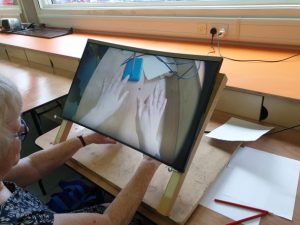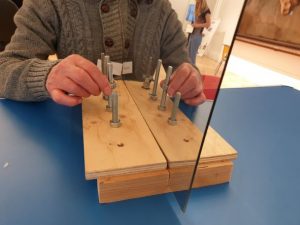
Experience in action: an art-science collaboration
Drs Ellen Poliakoff and Emma Gowen were awarded funding from The Manchester Institute for Collaborative Research on Ageing (MICRA) to work with artist, Dr Antony Hall to develop and use art-science experiential workshops to address sensorimotor processing in older adults autistic adults and people with Parkinson’s.
The sessions took place at the Manchester Art Gallery and autistic adults or people with Parkinson’s were invited to take part in a number of activities based around the Rubber Hand Illusion and discuss their experiences of movement. Researchers provided participants with instructions for each illusion and allowed them to experiment with different stimuli materials.
The different activities included: mirror hand experiments (left picture below), alien hands experiments – where participants place their hands under a flat-screen monitor and view someone else’s hands (right figure below) and an autoscopic self-seeing experiment using a VR headset to view themselves in a third person perspective.


The sessions formed part of BEAM labs ongoing work exploring control of movement and related sensory processing of bodily information such as proprioception or kinaesthesia (the sense that helps us “just know” where our limbs are in space) in older autistic adults and people with Parkinson’s. Motor coordination difficulties such as clumsiness and poor balance are increasingly recognised as an issue in autism. However, little research has explored these in older autistic adults. For those with Parkinson’s, movement problems are a primary symptom, yet the factors which may improve movement and how this relates to bodily perception are not well understood. Thus, in both conditions, it is important to understand how movement is affected and under what conditions it may be improved to inform support and future interventions.
Research also suggests that there is a higher rate of Parkinson’s Disease in autistic people and that some of the motor coordination difficulties in autism share similarities with those in Parkinson’s. Therefore, comparing movement and bodily perception could help us to understand more about the two conditions.
The workshops created lots of in-depth discussions around the movement experiences of those attending and generated lots of ideas and questions for possible future investigations.
More details about the activities used at these workshops can be found on Dr Antony Hall’s blog






0 Comments